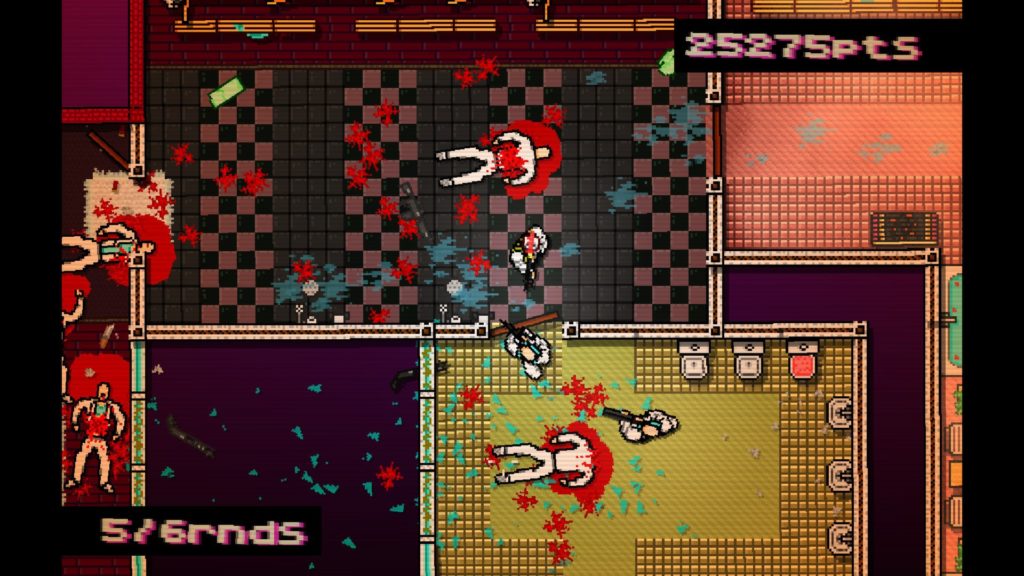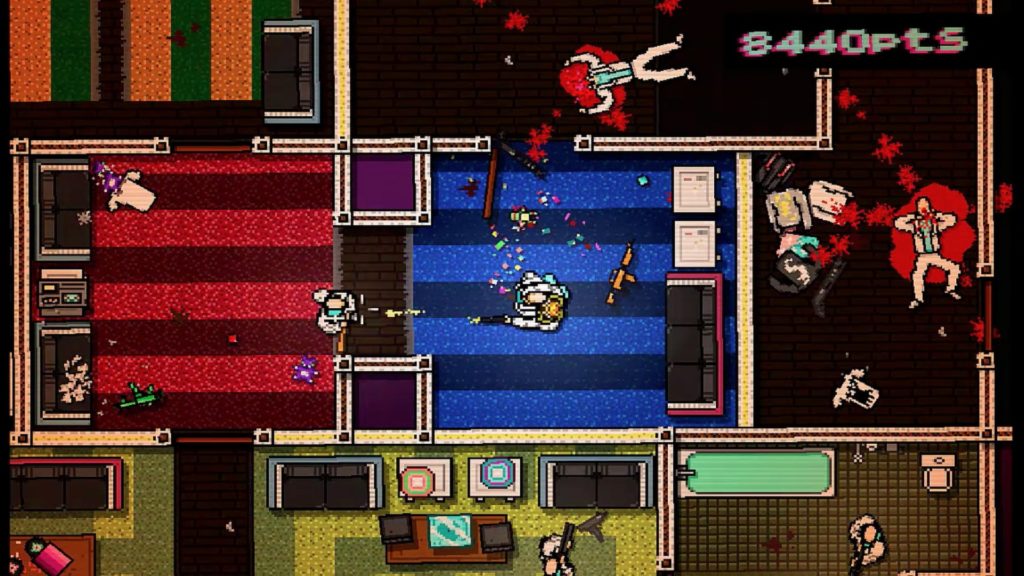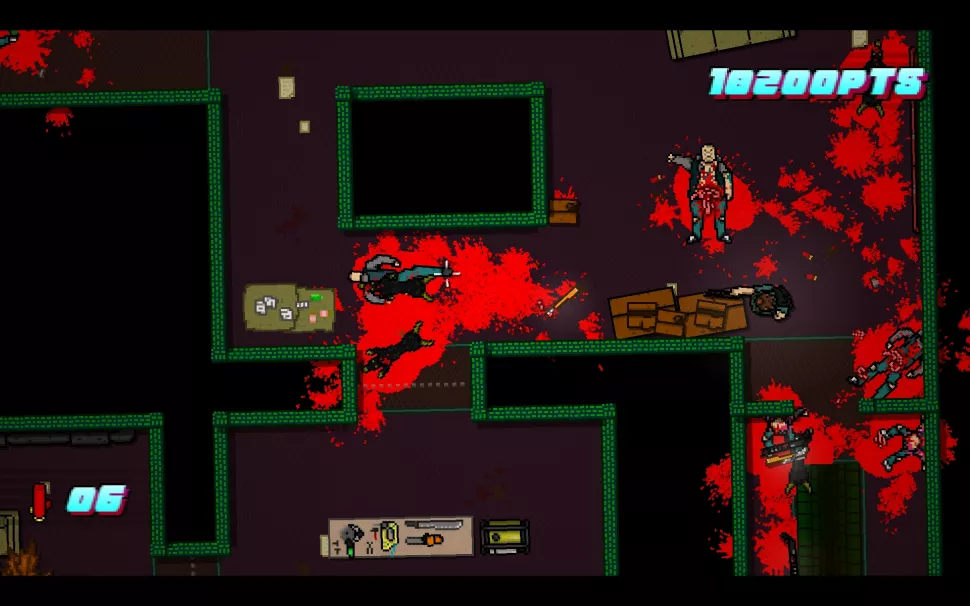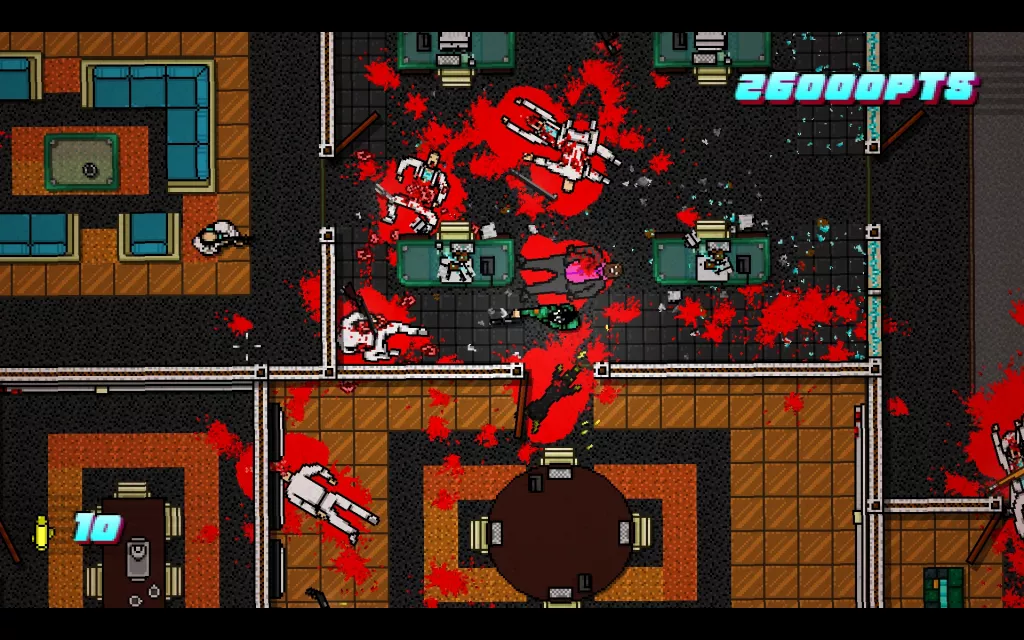I played both Hotline Miami games sometime within the last year and a half (my memory’s a bit fuzzy on the specific date, and honestly, it doesn’t matter).

Before I begin, I want to make one thing clear. These games are even more violent and depraved than I ever imagined, even after reading lots of reviews and seeing lots of screenshots. Much like with the show Squid Game, there’s a general sense among Extremely Online People that you simply must partake in these experiences that go out of their way to traumatize their audience.
I think that’s a load of crap. If you look at a game like this and think “that’s not for me,” I think it is absolutely valid, understandable, acceptable, and in no way worthy of judgment. Indeed, I wouldn’t be mad if you, dear reader, feel that reading this post isn’t your cup of tea.
With that out of the way, let’s talk about Hotline Miami.
As tends to happen more often than not, my take here is basically the opposite of the general consensus (I swear this isn’t intentional).

Most people – at least the ones I’ve encountered – will tell you that the first game is leagues better than the second. But I think the sequel is the only one of the two that’s worth anyone’s time, because it is the one that has a purpose to it.
Hotline Miami is a game in which characters commit violence seemingly for the sake of it. There are tiny hints and clues that suggest there is some sort of overarching story, but it’s the kind of stuff that is either meant to be interpreted metaphorically, or is intentionally vague so that the player can fill in the gaps themselves.
This vagueness is why I think the first game is more popular. Modern pop culture consumers love to speculate and create their own fan theories/worldbuilding/headcannon/etc, to the point where it often gets mistaken for official lore. Hotline Miami gives them the chance to do this, whereas the sequel does not.
Granted, it does have an actual ending that kinda sorta spells everything out. But it isn’t satisfying. It’s basically a reveal that comes out of nowhere, and feels like nihilism for nihilism’s sake.

As a whole, the game feels like the product of a bunch of developers who were still a little too young and “edgelord-y” for their own good. Which, again, may point to why it’s so highly regarded. But if you want a game that has a point – even a vague point that’s more metaphorical or philosophical than literal – I don’t think you’ll find one here.
That leaves us with Hotline Miami 2. Based on the remarks I’ve seen over the years, the consensus on the game is not a mere case of “it’s not quite as good”, or “the sequel can’t quite compete with the original because it can never recapture its raw freshness”. It’s more of a “this game is so much worse it doesn’t deserve to exist”.
Which is curious. Or maybe it isn’t when you look at how it differs. It looks and plays exactly the same, but Hotline Miami 2 has a real, actual story. Specifically, it’s a story about trauma. The characters you play as are given backgrounds and histories – and even character development – throughout the course of the game. You come to realize that the violence they commit is not arbitrary, but rather is triggered by something.

Not every character is sympathetic (though some of them are), but you can at least understand the “what” and the “why” of their behavior. There is motivation behind their actions, even if those motivations are sometimes repugnant. And while I get the idea that a story can be vague, at the same time, you still need some sort of hook with which to grab the player’s interest. Hotline Miami 2 has this, and it gives the game’s ultra violence a purpose. And I think that matters a lot.
It’s also true that Hotline Miami 2’s story has a beginning, middle, and end, and that there aren’t any unsolved mysteries. Everything is spelled out, and I think that in the modern pop cultural climate, that’s considered a no-no. To be clear, fans do want everything explained and chronicled and documented – but only if they’re the ones coming up with the answers.
There’s one more interesting “twist”, so to speak, about Hotline Miami 2. It isn’t just a story about trauma. As you get to the final stretch, you realize that it’s also an alternate history scenario, one that portrays what might happen if the Cold War played out differently. It isn’t strictly necessary for the story to work, but it also kind of is, because it gives additional context for the characters and their station in life. It’s an extra layer that makes the experience feel that much richer and more interesting.

In Hotline Miami, the story and setting are so abstract that the violence you commit feels hollow and detached. Meanwhile, in the sequel, I genuinely felt sick playing through some of the stages. The story – and the scenarios that result from it – made all the little pixelated characters feel like actual people. Mowing them down finally had the sense of weight that such an action should.
To reiterate, I don’t believe that everyone should feel obligated to play, or be interested in a game that generates such feelings. I do, however, believe that a game that tries to convey something is far more worthy of existing than one that goes out of its way to make you feel nothing at all.


Oh hey, I found another opinion on these games that matches closely to what I wrote here – https://www.pcgamer.com/reappraising-hotline-miami-2/